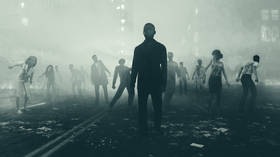Cannes opener renamed after Ukraine’s protest


French film director Michel Hazanavicius announced on Monday that he had renamed his zombie comedy ‘Z’, which is set to premiere during opening night at the Cannes festival next month. This follows a letter sent earlier to the festival and filmmaker by the Ukrainian Film Institute.
The director said that the film – a remake of a Japanese zombie comedy – would be retitled ‘Coupé’ in France, while its international title, ‘Final Cut’, remains the same.
The Ukrainian Film Institute had complained about the film’s title in a letter to Cannes, quoted by Vanity Fair on Friday, arguing that the letter ‘Z’ had become a symbol of the Russian military in Ukraine. The letter, along with the letter ‘V’, is painted on tanks and other vehicles, and some European countries, such as Germany, Lithuania, and Latvia, have actually gone so far as to ban public displays of the letter.
“My film is meant to bring joy and I wouldn’t want it to be associated in any way shape or form to this war,” Hazanavicius told Variety, insisting he was “happy” to change the title and “through this modest gesture show my full support to the Ukrainian people.”
The filmmaker had initially said it was “too late” to change the title for ‘Z’s’ French release, which comes in less than two weeks, and noted the name was “all over the marketing material and also in the credits.”
Ukrainian filmmakers have also excoriated Cannes over its decision to show Russian filmmaker Kirill Serebrennikov’s film ‘Tchaikovsky’s Wife,’ lamenting that it was partially funded by Russian billionaire Roman Abramovich.
Filmmakers from Ukraine reportedly feel they have a duty to show up despite what the Ukrainian Film Institute’s Natalie Movshovych called “mixed feelings” over the festival’s refusal to prohibit Russian entries, she told Variety.
“Cannes has stated that they won’t welcome anyone linked to the Russian government,” Moshovych acknowledged before suggesting it wasn’t enough. “All we are asking for is to postpone the premieres of these [Russian] films until Russia leaves our country and finally takes responsibility for everything they have done…”
Russian art, film, and music – and the creators, both living and deceased, of this cultural heritage – have been exiled from Western showcases and competitions as countries fall in line behind an unofficial ostracization campaign in addition to official Western sanctions. Even Russian-bred cats have felt the sharp sting of Western outrage.
Nevertheless, Cannes has declined to shut out all Russian filmmakers.
Russia attacked the neighboring state in late February, following Ukraine’s failure to implement the terms of the Minsk agreements, first signed in 2014, and Moscow’s eventual recognition of the Donbass republics of Donetsk and Lugansk. The German- and French-brokered protocols were designed to give the breakaway regions special status within the Ukrainian state.
The Kremlin has since demanded that Ukraine officially declare itself a neutral country that will never join the US-led NATO military bloc. Kiev insists the Russian offensive was completely unprovoked and has denied claims it was planning to retake the two republics by force.